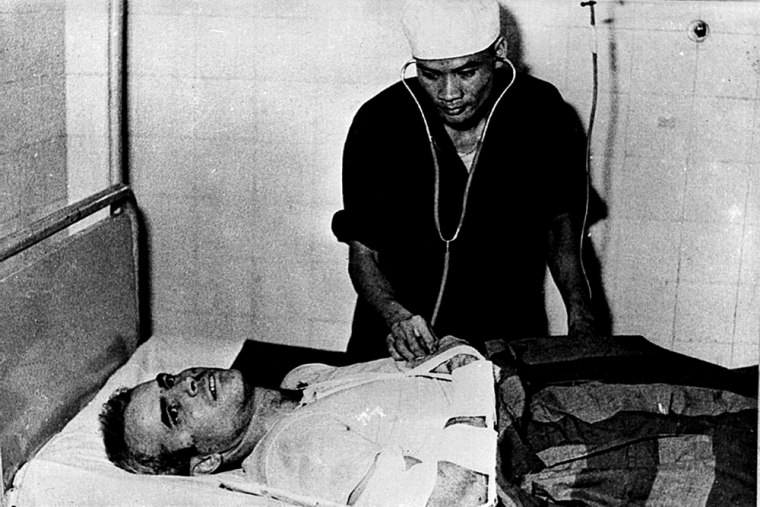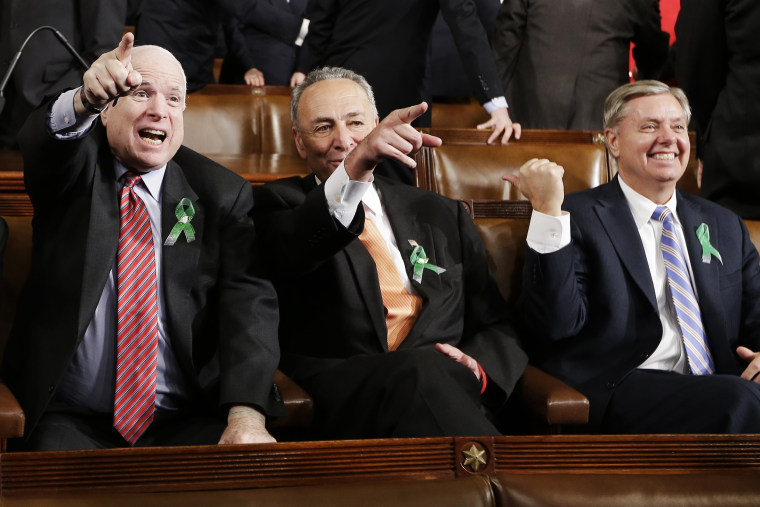Subscribe to Breaking News emails
You have successfully subscribed to the Breaking News email.
Subscribe today to be the first to to know about breaking news and special reports.

In Focus
From POW to presidential contender: John McCain's life in pictures
The son of a Navy admiral, John McCain was a prisoner of war in Vietnam before being elected to six terms in the U.S. Senate.

John S. McCain III, center, with his grandfather Vice Admiral John S. McCain Sr., at left, and father Admiral John S. McCain Jr. in a family photo from the 1940s.
McCain followed in the footsteps of his father and grandfather, attending the U.S. Naval Academy at Annapolis. He graduated in 1958.
At the age of 81, John McCain died surrounded by family at his home. At his death, he had served the United States of America faithfully for 60 years.






Sen. John Kerry, a fellow Vietnam veteran, and Sen. McCain examine a book on June 24, 1992 containing the names of the "total unaccounted for" soldiers who served in the Vietnam War.
McCain was first elected to the Senate in 1983, after retiring from the Navy in 1981.

McCain holds photos of himself as a 30-year-old P.O.W. outside the Army Museum in Hanoi on Oct. 19, 1992.
McCain served as a member of the Senate Select Committee on servicemen listed as missing in action (MIAs) in Southeast Asia.
McCain is also known for his work towards restoring diplomatic relations with Vietnam.

Republican presidential candidate Bob Dole and McCain wave to members of the American Legion at the group's annual convention in Salt Lake City on Sept. 3, 1996.
McCain was on Dole's short list of possible running mates. He had also been short-listed as a possible running mate for George H.W. Bush in 1988.


McCain announces his official bid for the White House in Nashua, New Hampshire, on Sept. 27, 1999, with his wife Cindy and adopted daughter Bridget.
McCain divorced his first wife shortly after meeting Cindy Lou Hensley, whom he married in 1980. They had three children together and adopted Bridget from an orphanage in Bangladesh.



During a news conference on April 2, 2001 in the Senate radio-TV gallery, senators celebrate the passage of the McCain-Feingold campaign finance bill which set new rules for political advertising and donations to candidates.
From left to right, Sen. Olympia Snowe, R- Maine, Sen. McCain, R- Ariz., Sen. Thad Cochran, R- Miss., and Sen. Russ Feingold, D- Wisc. President Bush signed the bill into law even though he said he had doubts "about the constitutionality of the broad ban on issue advertising, which restrains the speech of a wide variety of groups."


Sen. Joseph Lieberman and McCain participate in a seminar, "Iraq: A Turning Point," at the American Enterprise Institute on Jan. 5, 2007 in Washington.
Both senators had recently returned from a trip to Iraq, Afghanistan and the Middle East and reported that "a substantial and sustained surge" in the number of U.S. troops in Iraq would increase security and create an environment for political and economic stability.

McCain visits the popular Shorja market in central Baghdad on April 1, 2007.
McCain charged that the American people were not getting a "full picture" of progress in the security crackdown in the capital. McCain voted for the Iraq War Resolution in 2002, and began questioning troop levels as early as 2003.

Republican presidential hopefuls McCain, former Sen. Fred Thompson, Rep. Ron Paul, former Massachusetts Gov. Mitt Romney, former Arkansas Gov. Mike Huckabee and former New York City Mayor Rudy Giuliani participate in a televised debate on Jan. 5, 2008 in Manchester, New Hampshire.



McCain and his wife celebrate clinching the Republican presidential nomination at a campaign rally at the Fairmont Dallas hotel on March 4, 2008.
Almost out of money in the late summer of 2007 and written off as finished by some observers, McCain fought his way to a dramatic comeback, winning the party's nomination with victories that night in Texas, Ohio, Vermont, and Rhode Island.





McCain walks with Abdul Hafiz Ghoqa, spokesman of the Libyan National Transitional Council during his tour of the rebel headquarters in their eastern stronghold city of Benghazi on April 22, 2011.
McCain was the highest-ranking U.S. politician to visit Libya's rebel-held east since a popular uprising began against Moamer Kadhafi's rule in mid-February 2011.

Republican presidential candidate and former Massachusetts Gov. Mitt Romney talks with Sen. McCain on Romney's campaign bus in between events on Jan. 4, 2012 near Manchester, New Hampshire.
McCain announced his endorsement of Romney the day after Romney beat former U.S. Senator Rick Santorum by only eight votes in the "first in the nation" Iowa Caucuses.





The U.S. Senate's "Gang of Eight" hold a news briefing on Capitol Hill on April 18, 2013.
The eight senators, from left, Jeff Flake, R-Ariz., Marco Rubio, R-Fla., Dick Durbin, D-Ill., Chuck Schumer, D-N.Y. McCain, Bob Menendez, D-N.J., Lindsay Graham, R-S.C., and Michael Bennet, D-Colo., who crafted comprehensive legislation to overhaul the immigration system, went to great lengths to balance the competing priorities of dozens of interest groups in an 844-page bill in hopes it would improve the chances for passage of the bill.





McCain returns to the Senate with his wife Cindy on July 25, 2017.
McCain had been recently diagnosed with brain cancer but returned on the day the Senate was holding a key procedural vote on President Donald Trump's effort to repeal and replace the Affordable Care Act. He voted yes on a motion to proceed to debate on Republican health care legislation but a few months later decided to vote against the Republican health care bill.


Army Chief of Staff Gen. Mark A. Milley and McCain watch a special Twilight Tattoo performance on Nov. 14, 2017 at Fort Myer in Arlington, Virginia. Sen. McCain was honored with the Outstanding Civilian Service Medal for over 63 years of dedicated service to the nation and the U.S. Navy.